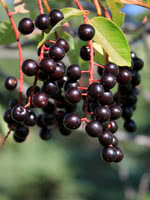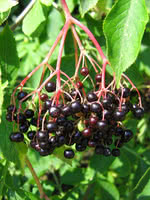Mon-Fri 9am - 5pm Mountain time
Western Chokecherry vs Black Elderberry
Prunus virginiana var. demissa
Sambucus canadensis
NOT AVAILABLE THIS SEASON - MIGHT RETURN
Western Chokecherry is a shrub or small tree commonly used for farmstead and field windbreaks.
It produces white flowers in the spring and edible dark purple fruit that matures between September and October. Its cherries are great for making for making jams, jellies or wine, but are not very palatable for raw eating.
Black Elderberry is a deciduous shrub native to eastern North America. You can plant this shrub in moist areas and it will help stabilize your soil. You can also use it on rural properties anywhere you'd use a lilac.
Black Elderberries are considered to be partially self-pollinating. So while they will still produce some berries without cross-pollination, planting with another variety will increase yields. Consider planting with Ranch Elderberry or Bob Gordon Elderberry.
Warning: the seeds, stems, leaves, roots, and uncooked berries of the Black Elderberry are poisonous to humans when eaten in quantity. You should cook the berries to make them safe for human consumption.
Western Chokecherry Quick Facts
Black Elderberry Quick Facts
Toxicity: toxic to horses, cattle, etc.)
Toxicity: leaves, stems, and uncooked berries are poisonous to humans

